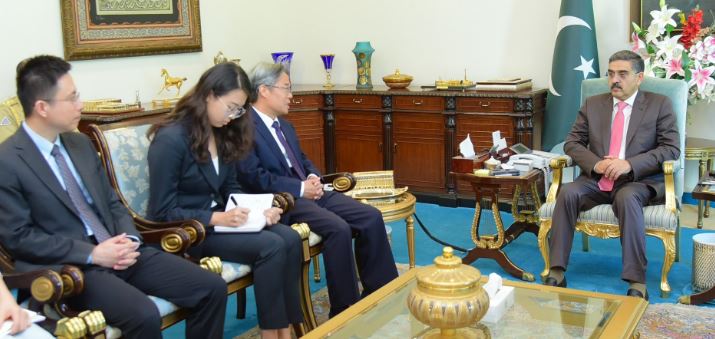Islamabad: China and Pakistan will ink significant agreements regarding motorways and highways during caretaker Prime Minister Anwaarul Haq Kakar’s four-day visit to Beijing starting Monday, according to a media report Sunday.
The agreements would be signed under the USD 60 billion China-Pakistan Economic Corridor (CPEC) programme, Dawn newspaper reported.
Kakar would travel to Beijing October 16 to participate in the ‘Third Belt and Road Forum (BRF) for International Cooperation’ from October 17 to 18.
“The prime minister will attend the opening ceremony of the BRF and address the high-level forum entitled ‘Connectivity in an Open Global Economy’,” the Prime Minister’s office said in a post on X Saturday.
A significant Memorandum of Understanding scheduled to be signed is related to the establishment of a modern Highway Research and Training Centre (HRTC) with China’s assistance, the paper said.
The project will prominently take centre stage during the prime minister’s discussion with the Chinese authorities, it added.
HRTC is a subsidiary of the National Highway Authority (NHA) for carrying out indigenous research in various faculties of highway engineering not limited to pavements, bridges, tunnelling environmental engineering, hydraulics and Geotech, but also covering technical training.
An NHA official said the HRTC is also affiliated with various engineering institutes in research, especially in pavements, including the National University of Science and Technology (NUST).
The highway authority has also proposed the Tunnelling Institute of the Frontier Works Organisation (FWO) to become an associate in research in tunnelling.
Under the ambit of CPEC, there is a promising joint research programme envisioned with the government of China from 2023 to 2027, which aims to foster collaboration and innovation in various domains of highway engineering.
A formal memorandum of joint research extension will be finalised and signed during the visit.
“We anticipate its significance in furthering the infrastructure cooperation between China and Pakistan. This extension is poised to be a cornerstone of joint cooperation in the road infrastructure with the National Highway Authority being a vanguard of such mutual cooperation,” the unnamed official said.
Under the agreement, HRTC Research Institute will be constructed on 530 acres, already acquired by the NHA at a cost of Rs 520 million.
The official said the institute would be built by a Chinese consultant under a Chinese grant of USD 52 million (Rs 15 billion). It includes infrastructure, a test track and indoor and outdoor lab equipment.
After completion and required training, it would be handed over to the NHA for operation.
The institute will also conduct studies of long-term pavement performance under controlled and uncontrolled conditions. Similarly, various research projects in reclaimed asphalt, bridges and tunnelling, training and degree courses in China and the development of engineering design manuals and standards for Pakistan are included in it.
Kakar will also sign an MoU to upgrade Karakoram Highway (KKH) from Raikot to Thakot, Raikot to Khunjerab (335 km), KKH phase-2 on the E-35 section from Havelian to Thakot, covering 120 km and introduction of a motorway section connecting Havelian to Mansehra.
In the second phase of the KKH project, the official said, the road would be designed in a way that it would remain operational around the year, especially in winter when it is closed due to heavy snowfall.
The KKH alignment is being designed in a way that it will not hit Bhasha Dam but it will go over it through tunnels.
The prime minister will also discuss the construction of a motorway from Dera Ismail Khan to Zhob, while the Gwadar port will remain the centre of discussion during the meetings in Beijing, according to the paper.
PTI
